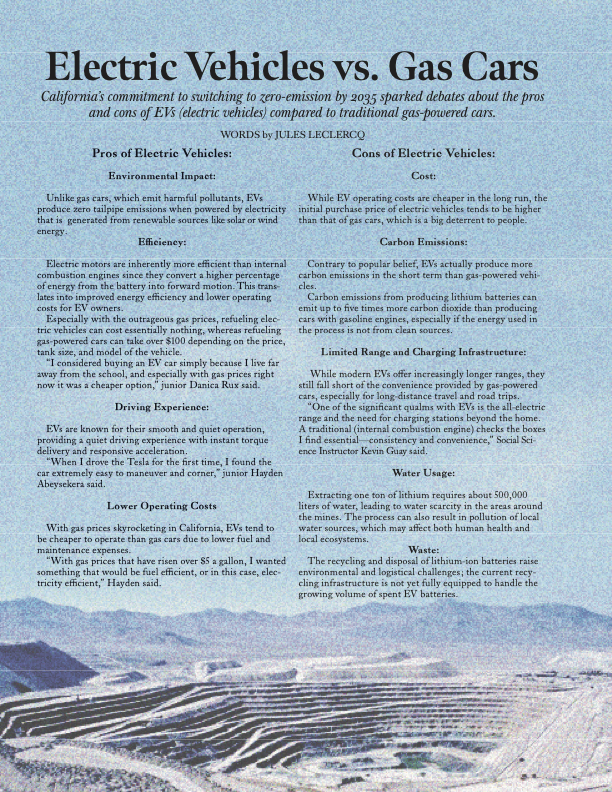Picture this. You are going about your life; you are working at your job and taking care of your family. In order to do these things, you have your trusty 15-year-old brown car. This car may be old, but it is still going strong. Although it has a dent on the side, numerous liquid stains on the interior fabric, wind-shield wipers that no longer work, and a moaning sound that exudes from the car whenever you drive the car faster than 55 miles per hour — it is good to go!
One day you are driving to work on a rainy day without functional windshield wipers, and all of a sudden the moaning gets louder and louder until you just can’t take it anymore — so you decide right then and there it is time to buy a new car. Enraged, you head to a Volkswagen dealership and ask to test drive a few cars.
You take a couple of rides on several gas cars and feel like they just aren’t good enough — then the salesperson recommends trying out the cars with diesel.
At first, you are unsure what difference diesel will make, but sure enough when you start driving a nice black Passat TDI, you can already feel the good performance and zippiness of the car. Your face lighting up with satisfaction, the salesperson informs you that the diesel car has better gas mileage than the gas cars, is good for the environment, and is reasonabley priced. You buy the car. Happy with your purchase, you continue to go about your life.
After a few months of loving your new car, you are driving to work on the morning of Sept. 18 listening to the radio. You turn the station to NPR. All of a sudden, you hear Robert Siegel talking about the German Volkswagen company admitting to the Environmental Protection Agency’s accusation of Volkswagen’s action of “intentionally dodging clean air rules on nearly half a million vehicles in the US.” When you hear this news, you are, to put things nicely, thoroughly bummed out, feel cheated, and continue to drive to work.
How many people in the world are experiencing similar circumstances?
Eleven million Volkswagen diesel cars have been sold worldwide. Volkswagen lied about the cars being good for the environment and, on top of that, the diesel itself is what makes the car bad for the environment. How did Volkswagen not quickly get caught for this scandal?
Volkswagen engineers created a software in diesel cars that tricks emissions tests into thinking that the cars emit the amount of gas allowed by regulation. The truth is, these cars actually pump out as much as 40 times what is allowed under the Clean Air Act. The level of nitrogen oxides are pumped out 40 times more from diesel engines than gas engines.
The EPA “will order a recall once the agency has done testing to confirm that Volkswagen’s proposed fix will be effective. EPA will conduct our own testing to confirm this. Then we will order a recall,” writes the spokeswoman for regulator Laura Allen in an email on Oct. 12. An auto recall is a manufacturer’s way of admitting that its product has a safety flaw. When recalls are issued, the manufacturer fixes the problem without charging the buyers.
Volkswagen has obviously made a huge mistake and is in need of a solution. Even if VW comes up with a solution, it is going to be hard to convince car owners to use it if the car’s performance and fuel economy are worse.
Jeff Hinton, the owner of a 2013 Passat diesel, said, “I wouldn’t want my car recalled or reprogrammed . . . if it is going to hurt the performance, because that is not what I paid for.” The idea of having their cars’ emissions cleaned up just to make the car perform worse does not make people want to use the fix. So how is VW planning to solve the problem anyway?
The repairs that Michael Horn, head of Volkswagen’s American unit, outlined would take ten hours to do on one car — totalling up to years of repairs for all the cars. Dan Becker, director of the Safe Climate Campaign at the center for Auto Safety, said during a telephone interview, “Volkswagen made this disaster; it is its responsibility to fix it.”
VW has made a tremendous mess of things that will negatively affect people’s attitudes towards Volkswagen. The mess will take years to solve. In the meantime, the unhappy car owners will have to continue to drive their cars in shame and at the same time continue to worsen the environment.
Will the angry car owners win their lawsuits and happiness back? Will Volkswagen come up with a solution that fixes the environmental component and keeps the car’s performance up to par? Or will the problem never be properly solved, leaving VW owners angered and the environment worsened? My guess is the latter.
Corporations That Don’t Care: Volkswagen
November 6, 2015

0
Tags:
Donate to The Fourth Estate
$50
$500
Contributed
Our Goal
Your donation will support the student journalists of Laguna Blanca School. Your contribution will allow us to purchase equipment and cover our annual website hosting costs.





































